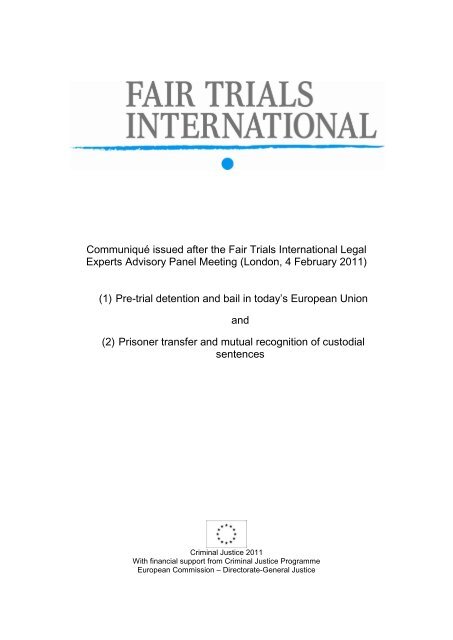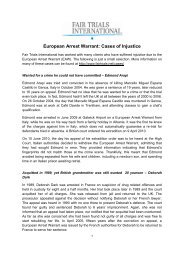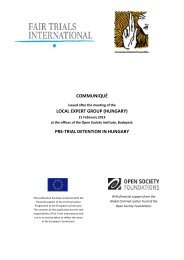leap communique feb 2011 offices of clifford chance, canary wharf ...
leap communique feb 2011 offices of clifford chance, canary wharf ...
leap communique feb 2011 offices of clifford chance, canary wharf ...
Create successful ePaper yourself
Turn your PDF publications into a flip-book with our unique Google optimized e-Paper software.
Communiqué issued after the Fair Trials International LegalExperts Advisory Panel Meeting (London, 4 February <strong>2011</strong>)(1) Pre-trial detention and bail in today’s European Unionand(2) Prisoner transfer and mutual recognition <strong>of</strong> custodialsentencesCriminal Justice <strong>2011</strong>With financial support from Criminal Justice ProgrammeEuropean Commission – Directorate-General Justice
Introduction1. Fair Trials International (“FTI”) formed the Legal Experts Advisory Panel (“LEAP”) in 2008to provide an opportunity for experts in criminal justice, fundamental rights and access tojustice in the EU to meet and discuss issues <strong>of</strong> mutual concern and to provide advice,information and recommendations to inform FTI's European policy position. The sixthmeeting <strong>of</strong> LEAP took place at the <strong><strong>of</strong>fices</strong> <strong>of</strong> Clifford Chance in London on 4 February<strong>2011</strong>. 18 LEAP Members and 8 invited guests, representing 13 European jurisdictions,attended. The meeting was chaired by HH Dennis Levy QC.2. Since its creation LEAP has had a huge impact, allowing FTI to use members’ expertiseto achieve change. For example, there has been significant progress on the EuropeanArrest Warrant (“EAW”), which has been discussed at two previous LEAP meetings.There is now increasing acknowledgment <strong>of</strong> the need for reform, as illustrated by the UKGovernment setting up an independent panel to review the UK’s extraditionarrangements. A group <strong>of</strong> LEAP members, together with FTI, has also written toCommissioner Viviane Reding, voicing their concerns about the EAW and calling forreform. Mrs Reding responded, accepting there was “significant room for improvement inthe operation <strong>of</strong> the European Arrest Warrant.”3. Increasing use <strong>of</strong> the EAW is having the undesirable and unnecessary outcome <strong>of</strong> evergreater numbers <strong>of</strong> individuals spending significant time in prison on remand in EUcountries other than their own. In the first part <strong>of</strong> the meeting, members discussed theuse <strong>of</strong> pre-trial detention in their jurisdictions and the apparently discriminatory way baildecisions are made where defendants are non-nationals. As well as discussing problemsunder the current system, members examined the Framework Decision on the EuropeanSupervision Order (“ESO”), discussing its potential for improving the system andforeseeable problems with its operation. The ESO is due to be implemented by allMember States by 1 December 2012.4. The second part <strong>of</strong> the meeting was dedicated to discussing prisoner transfer betweenEU Member States and the expected impact <strong>of</strong> the Framework Decision on the mutualrecognition <strong>of</strong> custodial sentences, which is to be implemented by all Member States by 5December <strong>2011</strong>, apart from Poland, which has secured a 5 year extension.1. Pre-trial detention and bail in today’s European Union5. The Panel agreed that non-nationals are frequently discriminated against when it comesto bail decisions. They are more likely than nationals in similar cases to be held in pre-trialdetention, which impacts on their ability to prepare for trial effectively. Members explainedhow bail operated in their jurisdictions and commented on existing practices which canlead to unfairness for non-national defendants.Spain: In Spain bail is reviewed before a judge every week or two weeks. For nonnationals,bail is difficult to get. The maximum period <strong>of</strong> pre-trial detention is 4 years. Thelength in practice depends on where in Spain the defendant is held. For example, 4 years’pre-trial detention in Madrid is unusual, yet in Tenerife it is frequently served. If the casehas not been decided before the four years have elapsed, the person is released on bail.Bail review hearings are mainly dealt with on paper, but lawyers can address the judge inprivate to negotiate bail.Italy: In Italy the judge’s decision whether or not to grant bail involves an assessment <strong>of</strong>the seriousness <strong>of</strong> the <strong>of</strong>fence. Italy has a maximum pre-trial detention period <strong>of</strong> 6 years,yet some cases can go unresolved for 10 years or more. (In Italy time is counted as pretrialdetention until all final appeals have been exhausted.)Czech Republic: The maximum length <strong>of</strong> pre-trial detention in the Czech Republic is 16months. Release is automatic once this limit is met. Bail is available as an alternative:there are no mandatory bail conditions. However, it is almost impossible for non-nationalsto get bail. Once a decision to remand in custody is made, the person has a right to1
egular review. However, in practice, the original decision is usually rubber-stamped insubsequent review hearings.England and Wales: If a person is charged with a serious <strong>of</strong>fence the burden <strong>of</strong> pro<strong>of</strong>effectively rests on the defendant to show why bail is appropriate. This infringes the rightto a presumption <strong>of</strong> innocence. When it comes to non-nationals being granted bail, thesame approach is followed in England and Wales as in much <strong>of</strong> Europe.Scotland: The trial must start within 140 days <strong>of</strong> arrest. Monetary bail deposits have beenabolished in Scotland, but can still be imposed as a special condition: there are signs thatmoney bail may be brought back. Scottish prisons are full <strong>of</strong> people who have violatedbail conditions and yet, due to prison overcrowding, convicted persons are being releasedearly.Bulgaria: In Bulgaria pre-charge detention is treated differently to pre-trial detention.Following arrest if no charges are brought within 24 hours, the person must be released.There are two types <strong>of</strong> measures to prevent evasion from justice: 1) measures which donot restrict the defendant's personal freedom (eg signing in at a police station and bail)and measures either resulting in restrictions on liberty (eg home arrest) or leading todeprivation <strong>of</strong> liberty (eg detention on remand). The law stipulates that pre-trial detentioncan be imposed provided there is reasonable suspicion that the person has committedthe <strong>of</strong>fence. The rationale is that if reasonable suspicion is shown, there is a risk theperson will abscond if the crime in question is punishable with a sentence <strong>of</strong> more than 10years’ imprisonment. The burden <strong>of</strong> proving this is not in fact a risk rests in practice,though not in law, with the defence. The bringing <strong>of</strong> charges is not subject to judicialreview and sometimes new charges are formulated in order to ensure more stringentdetention conditions are imposed. In most cases, pre-trial detention is not allowed to lastfor more than one year.France: The judge decides whether to grant bail or remand in custody and must now givereasons for this decision (following pressure from the European Court <strong>of</strong> Human Rights(“ECtHR”)). This has led to more people being granted bail. Judges try to ensure thatnon-national suspects do not abscond. In France, a large number <strong>of</strong> non-nationaldefendants face drugs charges. In such cases the judge is <strong>of</strong>ten suspicious aboutaccepting bail deposits, considering that the money may have a questionable source. Onaverage, pre-trial detention lasts for one year in France.Poland: In the mid-1990s responsibility for bail decisions moved from the prosecutor tothe court. Pre-trial detention is supposed to be a last resort, where bail will not suffice toprotect the interests <strong>of</strong> justice. Courts can impose alternatives, such as regular signing inat a police station or electronic tagging. It is difficult to persuade a judge to apply taggingdue to functional problems with the tagging system.Pre-trial detention is only supposed to last for 3 months, with an upper limit <strong>of</strong> 2 years, butin practice these periods are regularly extended. Review hearings are usually a rubberstamping<strong>of</strong> previous bail decisions. The defendant is represented at all the hearings butonly attends the first. Courts can order pre-trial detention if the prosecutor indicates thatthe evidence suggests a high probability <strong>of</strong> guilt, or where severity <strong>of</strong> the likely sentenceleads to a presumption the person will attempt to evade justice. The Court <strong>of</strong> Appealadopts exactly the same approach to pre-trial detention as the lower courts. The ECtHRhas frequently found Poland in breach <strong>of</strong> Art 5 ECHR. Legislation alone cannot producechange: the mentality <strong>of</strong> judges must also change.Romania: Following recent reforms in Romania, 10% <strong>of</strong> the prison population are pre-trialdetainees, reduced from 40%. This reduction was brought about by a change in theCriminal Procedure Code which saw pre-trial detention powers removed from prosecutorsand given to judges. This was accompanied by a strengthening <strong>of</strong> habeas corpusremedies. Under new time limits, pre-trial detention during the investigation stage can lastfor a maximum <strong>of</strong> 180 days. Generally, pre-trial detention can last up to the equivalent <strong>of</strong>half the maximum sentence for the alleged <strong>of</strong>fence. A shift in the mentality <strong>of</strong> judges has2
taken place and a probation service has been introduced. Conditions can be attached tobail, such as a prohibition on leaving the country or a particular city. These measureshave helped reduce the number <strong>of</strong> pre-trial detainees. The impetus for change was EUaccession and general modernization <strong>of</strong> the justice system.Germany: In Germany pre-trial detention can last for a maximum period <strong>of</strong> 6 months. Thiscan only be extended in very serious cases. There is automatic review <strong>of</strong> detention after 3months. Pre-trial detention is <strong>of</strong>ten used as a bargaining chip by prosecutors. However,there is generally a presumption that bail will be granted.Ireland: In Ireland most people are granted bail even for serious <strong>of</strong>fences. This is nowstarting to change, apparently due to the large number <strong>of</strong> non-nationals going through thecriminal justice system. Afro-Caribbean and Roma people <strong>of</strong>ten receive discriminatorytreatment in bail applications. This has pushed up the number <strong>of</strong> remand prisoners. Whatis needed is a bail regime free from discrimination and a fixed time limit for thecommencement <strong>of</strong> trial. So far there have been no European Convention on HumanRights (“ECHR”) challenges on this point. The length <strong>of</strong> the possible sentence is explicitlyacknowledged as something which can be considered by the judge when making adecision on bail.6. The Panel identified the following key problems:i. in several EU countries pre-trial detention is, in practice, the norm, even though inlegal theory it is only meant for exceptional cases;ii. decisions ordering pre-trial detention routinely infringe Article 5 ECHR, being orderedon illegitimate grounds connected with the merits <strong>of</strong> a case, the length <strong>of</strong> thesentence attributable to the crime, or the apparent strength <strong>of</strong> the evidence;iii. non-nationals and ethnic minorities are over-represented as a class <strong>of</strong> pre-trialdetainees;iv. excessively long periods are being spent in pre-trial detention;v. conditions in pre-trial detention are <strong>of</strong>ten unacceptable, making effective trialpreparation impossible and causing needless infringement <strong>of</strong> Article 8 ECHR rightsfor defendants and their families (as well as, in some cases, infringements <strong>of</strong> Article 3ECHR rights).7. It was agreed that the crucial fundamental rights protection in this area – one lacking inseveral EU jurisdictions – is the right to a regular judicial review <strong>of</strong> pre-trial detentiondecisions, with defendants present and legally represented. These reviews must be morethan a mere rubber-stamping <strong>of</strong> previous decisions, but be based on a fresh andobjective analysis <strong>of</strong> all available relevant information, with a reasoned decision by thecourt. Steps must also be taken to eradicate discriminatory approaches to bail in cases<strong>of</strong> non-nationals and members <strong>of</strong> ethnic minorities, to end the use <strong>of</strong> excessively longperiods <strong>of</strong> pre-trial detention, to introduce effective supervision systems, and to raisestandards in detention facilities to an acceptable minimum, ensuring particularly that theEuropean Prison Rules are complied with ins<strong>of</strong>ar as pre-trial detainees are concerned.The European Supervision Order8. The Panel examined the European Supervision Order (“ESO”). This instrument lays downrules according to which one Member State recognizes a decision issued in anotherMember State imposing supervision measures, as an alternative to pre-trial detention.This would allow defendants in appropriate cases to remain in their home country atconditional liberty, until trial, with express provision for the European Arrest Warrant to beused to require the person’s surrender if supervision conditions were breached. TheFramework Decision must be implemented by all Member States by 1 December 2012.9. Members acknowledged the significant benefits <strong>of</strong> a system <strong>of</strong> cross-border supervision,particularly given the unacceptable practices currently seen in many European countrieswith regard to the excessive use and length <strong>of</strong> pre-trial detention. The Panel welcomedthe fact that Member States had adopted a measure that could substantially reduce thenumber <strong>of</strong> non-nationals held in pre-trial detention and safeguard individuals awaiting trial3
against unjustified infringements <strong>of</strong> their fundamental right to liberty, family life and theopportunity to prepare properly for trial. With over-crowding a major problem in many EUprisons and non-nationals and pre-trial detainees both over-represented classes <strong>of</strong>prisoner, such a system had clear potential advantages.10. However, Members agreed there were shortcomings with the ESO:i. the lack <strong>of</strong> any express obligation on States to issue ESOs in suitable cases;ii. the absence <strong>of</strong> clear, objective criteria for when an ESO should be issued;iii. the prospect <strong>of</strong> administrative as opposed to judicial authorities taking decisionsunder ESOs: this is not acceptable in situations where an untried person’s liberty andfamily life are at stake and could also lead to ESOs being issued for inappropriatereasons;iv. the absence <strong>of</strong> provisions about the role and participation <strong>of</strong> the defence; andv. undue complexity around what happens in case <strong>of</strong> a breach <strong>of</strong> ESO conditions, whichcould lead to reluctance on the part <strong>of</strong> issuing authorities to use ESOs, even inappropriate cases. The ESO could in fact inhibit proactive solutions in cross-borderbail arrangements, due to its over-complexity and to the absence <strong>of</strong> commonpractices across member states.11. The Panel recommended that, in order for the ESO to be capable <strong>of</strong> realising its fullpotential benefit (both for individuals and member states), further provisions and guidanceare needed in the following areas, prior to the ESO’s implementation:i. clear provisions on when an ESO should be issued, with an obligation on memberstates to use ESOs in appropriate cases;ii. given the disparity between bail regimes and maximum pre-trial detention periods intoday’s EU, there is an urgent need to raise and harmonise standards <strong>of</strong> decisionmakingat remand hearings and to bring about greater approximation <strong>of</strong> alternativesupervision measures between member states, including where necessary setting upsuitable supervision and bail systems;iii. guidance is required on the role and participation <strong>of</strong> the defence, to ensure that, insuitable cases, defendants can request the issue <strong>of</strong> ESOs;iv. simplification and greater flexibility around what happens if ESO conditions arebreached.12. Members were concerned that, unless these issues were now tackled, there was adanger that the ESO, once implemented, would operate in a discriminatory and unevenway across Europe and would fail to fulfil its potential and meet its original objectives.13. Members also agreed that a systematic programme <strong>of</strong> information and education forjudges, prosecutors and legal defence practitioners, is crucial to ensure the ESO is usedto the full in all appropriate cases.2. Prisoner transfer: Framework Decision on mutual recognition <strong>of</strong> custodialsentences14. The Panel shared their experience <strong>of</strong> the current prisoner transfer system in EUcountries. It was agreed that enabling foreign prisoners to return to their home States tocomplete their sentences improves rehabilitation prospects, as prisoners are placed in amore familiar environment to prepare for re-entry into society. Ensuring that prisonerswere detained close to home also makes life easier for family members. However, thecurrent transfer system was agreed to be bureaucratic and slow.15. Unfairness is also frequently seen in connection with the difficulty some countriesencounter when deciding how to enforce or convert sentences imposed overseas whichwould not have been imposed in similar cases domestically. Such decisions <strong>of</strong>ten lead toarbitrary and unjust results for the transferred prisoner. For example, in England andWales, there was a disparity in the treatment <strong>of</strong> transferred prisoners serving determinateand indeterminate sentences. A person serving a life sentence imposed abroad will, ineffect, have their sentence converted after transfer. This <strong>of</strong>ten leads to a significantreduction in the amount <strong>of</strong> time served in prison. However, a prisoner serving a4
determinate sentence will not have the same opportunity. Instead, the sentence simplycontinues to be enforced. This can mean that more serious <strong>of</strong>fenders will spend less timein prison than less serious <strong>of</strong>fenders.16. Members examined the Framework Decision on the mutual recognition <strong>of</strong> custodialsentences, which aims to simplify and speed up the prisoner transfer process. Membersexpressed some major concerns about the human rights implications <strong>of</strong> the FrameworkDecision:i. Material prison conditions and the laws governing the rights <strong>of</strong> detainees vary widelyacross the EU. The Framework Decision could be used to send people to be detainedin prisons with very poor conditions. There is also a danger that transfers will be usedto ease overcrowding in one Member State, exacerbating overcrowding in anotherMember State. This could be a particular problem where one Member State has ahigh proportion <strong>of</strong> prisoners who are nationals <strong>of</strong> another, perhaps neighbouring,Member State.ii. Difficulties will also be encountered around sentencing equivalents. For example, inBelgium, electronic tagging is classed as a prison sentence, whereas in most otherEU States it is not. Widely divergent rules regarding conditional or early release couldbecome an obstacle to transfer. Determining equivalent sentences will be especiallyproblematic where the <strong>of</strong>fence falls into one <strong>of</strong> the categories <strong>of</strong> <strong>of</strong>fence to which dualcriminality checks are not required. It will be difficult for an executing State to enforcean equivalent sentence where there is no equivalent <strong>of</strong>fence.iii. From a procedural rights perspective, the Framework Decision is disappointinglyweak. The procedural rights “Roadmap” measures will not apply to the proceduresenvisaged by the Framework Decision because it is not concerned with the preconvictionperiod. However, the fact that the Framework Decision removes therequirement that the sentenced person consents to transfer means that even greaterattention must be paid to the possible infringement <strong>of</strong> fundamental rights, posttransfer.Greater access to information on prison conditions and other States’ criminaljustice systems is therefore vital. This will enable issuing States to take all relevantfactors into account before initiating transfer.iv. Members considered it unfortunate that the instrument contains no expressrequirement for prisoners subject to transfer decisions to be given information aboutprison conditions in the home state, or the transfer process generally. In thecircumstances, it is all the more important for the protection <strong>of</strong> fundamental rights thatpersons subject to a transfer decision are legally represented and their lawyers aregiven sufficient time prior to transfer to collect information about prison conditions andadvise their clients <strong>of</strong> the effect <strong>of</strong> the legislation and potential remedies where itcould infringe fundamental rights.v. Given the apparent lack <strong>of</strong> research on the number <strong>of</strong> prisoners who will fall within theambit <strong>of</strong> the Framework Decision, members feared that some countries will not besufficiently prepared for its impact. Different Member States have differentconceptions <strong>of</strong> social rehabilitation and <strong>of</strong> the factors to be considered when decidingwhether transfer would facilitate rehabilitation. The Framework Decision does notprovide general criteria. However, if each case is assessed on its merits usingdifferent tests, this could lead to uncertainty and unfairness.vi. Given that the Framework Decision removes the requirement that the sentencedperson must consent to transfer, even greater attention must be paid to the possibleinfringement <strong>of</strong> fundamental rights post-transfer. Greater access to information onprison conditions and other States’ criminal justice systems is therefore vital. This willenable issuing States to take all relevant factors into account before initiating transfer.5










